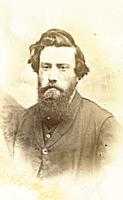Alexander Fyfe
| Alexander Fyfe | |
|---|---|
 | |
| Member of the Victorian Legislative Council for Geelong | |
| In office June 1854 – March 1856 | |
| Member of the Victorian Legislative Assembly for Geelong | |
| In office November 1856 – November 1857 | |
| Preceded by | New seat |
| Succeeded by | George Board |
| Member of the Queensland Legislative Assembly for Rockhampton | |
| In office 20 June 1870 – 24 November 1873 | |
| Preceded by | Henry Milford |
| Succeeded by | Charles Buzacott |
| Personal details | |
| Born | Alexander Fyfe 1827 Scotland |
| Died | 1903 (aged 75–76) Preston, Victoria, Australia |
| Resting place | Coburg Cemetery |
| Nationality | Scottish |
| Occupation | Pastoralist, Ironmonger's assistant |
| Religion | Presbyterian |
Alexander Fyfe (1827 – 1 May 1903) was a Scottish-born settler of Victoria, Australia, who became a member of the Victorian Legislative Assembly, Victorian Legislative Council and the Queensland Legislative Assembly.[1]
Early life
Fyfe was born in Scotland, the son of Jane Nicholson Bailliff. Fyfe emigrated to Australia, arriving in Melbourne in January 1848 aboard the Stag[2] and settled in Geelong.[1]
In Geelong, he was involved in the establishment of the:[3]
- first building society
- the first bathing house
- the Geelong Chamber of Commerce
- the fire brigade
- a newspaper
- the Mechanic's Institute
- the first regatta (he owned four full-rigged vessels and chartered eleven more)
He was president of the:
- Mechanic's Institute
- the first cricket club in Victoria
- Geelong Agricultural Society
and a director/trustee of:
- the Geelong Botanic Gardens
- the Flinders State School
- the Geelong-Melbourne railway
and captain of the first volunteer regiment.[3]
Alexander Fyfe was one of the first gold diggers at Ballarat. He was secretary of the Anti-Gold License Committee[4] and contributed to legal expenses of the trial of Peter Lalor, the leader of the Eureka Rebellion[3]
Politics
Fyfe was elected to the Victorian Legislative Council for Geelong in June 1854,[5] a position he held until the original Council was abolished in 1856.[1]
Fyfe was elected to the inaugural Victorian Legislative Assembly as one of the four members for Geelong in November 1856, a seat he held until resigning in November 1857 due to insolvency.[1]
Fyfe moved to Queensland where he purchased a pastoral property from P. F. MacDonald near Peak Downs [3] and became a pastoralist and auctioneer. He represented Rockhampton in the Queensland Legislative Assembly from 20 June 1870 to 24 November 1873.[2]
Latter life
Fyfe returned to Melbourne around 1873 and died in Preston, Victoria on 2 May 1903.[1]
References
- ↑ 1.0 1.1 1.2 1.3 1.4 "Fyfe, Alexander". re-member: a database of all Victorian MPs since 1851. Parliament of Victoria.
- ↑ 2.0 2.1 Fyfe, Alexander; Government of Queensland. Retrieved 13 February 2015.
- ↑ 3.0 3.1 3.2 3.3 "DEATH OF MR. A. FYFE.". Morning Bulletin (Rockhampton, Qld. : 1878 - 1954) (Rockhampton, Qld.: National Library of Australia). 12 May 1903. p. 5. Retrieved 26 March 2015.
- ↑ "ANTI-GOLD LICENSE COMMITTEE.". Geelong Advertiser and Intelligencer (Vic. : 1851 - 1856) (Vic.: National Library of Australia). 14 September 1853. p. 2 Edition: DAILY. Retrieved 26 March 2015.
- ↑ "The Election. Declaration of the Poll". Geelong Advertiser and Intelligencer (National Library of Australia). 26 June 1854. p. 4. Retrieved 24 August 2014.
| Victorian Legislative Council | ||
|---|---|---|
| Preceded by James Cowie |
Member for Geelong June 1854 – March 1856 With: Alexander Thomson 1854 James Harrison 1854–1856, James Strachan 1854–1856 |
Original Council abolished |
| Victorian Legislative Assembly | ||
| New district | Member for Geelong November 1856 – November 1857 With: Charles Sladen Charles Read John Brooke |
Succeeded by George Board |
| Parliament of Queensland | ||
| Preceded by Henry Milford |
Member for Rockhampton 20 June 1870 – 24 November 1873 |
Succeeded by Charles Buzacott |